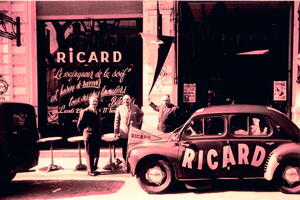The man who invented pastis
Long before it was applied to an anise-flavoured spirit, the Provençal term "pastis" simply meant "a mixture," "a mess," or, figuratively speaking, "a sticky situation."
When 74-proof absinthe—the "Green Fairy" of 19th century artists—was banned in 1915, several local distilleries began producing a lower-proof beverage more or less based on the absinthe recipe. In Provence, where most of the beverage's herbal ingredients grow, this alcohol-based maceration of herbs, sugar and liquorice root became known as "pastis."
In the Marseille suburb of Sainte-Marthe, a young man by the name of Paul Ricard, the son of local wine merchants, soon realized what a tremendous opportunity that "pastis" could be for the family business. In 1932, after a stint in art school, young Paul launched "Ricard, the genuine Pastis of Marseille."
Six years later, the artisanal beverage had turned industrial; the small factory was putting out close to 2.5 million litres per year and the brand name "Ricard" had all but replaced the term "pastis."
Born a hundred years ago, Paul Ricard went on to live a long life, transforming the family business into an international behemoth, a world-leader in anise beverages, whiskies and other spirits. In 2000, the company celebrated the two billionth bottle produced. Of the 130 million bottles of pastis that are sold in France every year, 35 percent bear the name Ricard, three times more than the closest competitor Pastis 51.
The founder of "Société Ricard" was more than an entrepreneur. A repressed artist, he had ideas on almost everything from architecture to environment preservation, public administration, politics and social organization.
In order to implement his theories—and also to exhibit the innumerable paintings he produced throughout his life—he acquired two small islands, Bendor and Les Embiez, off the coast of Toulon, as well as a large rural domain (Méjanes) in the Camargue.
The islands bear witness to Paul Ricard's utopias. They are little kingdoms of kitsch from which motor vehicles are banned—a bit like the seaside "Village" in the 1960s TV series "The Prisoner." There, with the help of a glass of pastis, visitors can experience the kind of ideal life, in an ideal setting, that Paul Ricard created for them.



